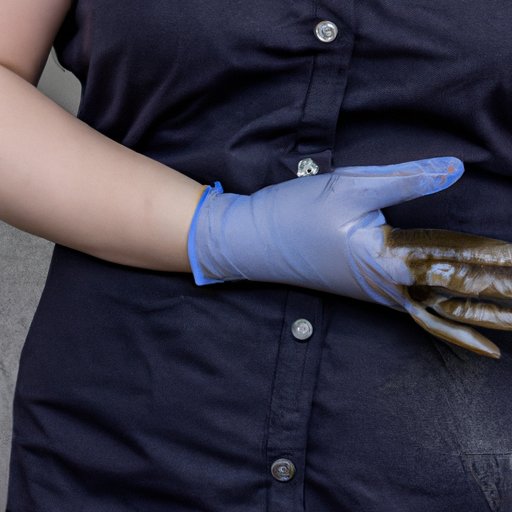
How to Get Oil Stains Out: Tips and Methods
Oil stains are a common problem that can occur in various settings, from cooking at home to working on your car. These stains can be unsightly and difficult to remove, especially without the right techniques. However, with the right tools and methods, you can easily get rid of oil stains and restore the affected surface to its original condition.
Method 1: Using Baking Soda and Dish Soap
This method involves creating a paste using baking soda and dish soap to absorb and break down the oil stain. Here’s how to do it:
- Mix baking soda and dish soap in a 2:1 ratio to create a paste.
- Apply the paste generously over the oil stain and gently rub it in with a brush or cloth.
- Let the paste sit for at least 30 minutes or overnight, depending on the severity of the stain.
- Rinse the affected area thoroughly with water to remove the paste and the oil stain.
- Repeat the process if necessary until the stain disappears completely.
Note that this method is most effective on fabric and carpet stains, rather than hard surfaces such as concrete or asphalt. Also, be sure to test the paste on a small and inconspicuous area first to ensure it does not cause any discoloration or damage.
Method 2: Applying Rubbing Alcohol
Rubbing alcohol is another effective solution for removing oil stains. Here’s how to use it:
- Apply rubbing alcohol generously over the oil stain, then gently rub the stain with a brush or cloth.
- Let the rubbing alcohol sit for at least 30 minutes to break down the oil.
- Rinse the area thoroughly with water to remove the rubbing alcohol and oil stain.
- Repeat the process if necessary until the stain disappears completely.
Be careful when using rubbing alcohol as it is flammable and should be kept away from heat sources. Also, avoid using it on delicate fabrics as it can cause discoloration or damage.
Method 3: Utilizing Cornstarch
Cornstarch is another option that can help absorb and remove oil stains from fabric. Here’s how to use it:
- Sprinkle a generous amount of cornstarch over the oil stain, covering the entire affected area.
- Let the cornstarch sit for at least a few hours or overnight so it can absorb the oil.
- Vacuum up the cornstarch from the affected area, ensuring that all the powder has been removed.
- If the stain is still visible, repeat the process until it is gone.
This technique is particularly effective for fresh oil stains, but may not work for set-in stains that have been there for a while.
Method 4: Trying Vinegar and Hot Water
Vinegar and hot water can also be used to remove oil stains from various surfaces. Here’s how to do it:
- Mix equal parts of white vinegar and hot water to create a solution.
- Apply the solution over the oil stain and let it sit for 15-30 minutes, depending on the severity of the stain.
- Gently rub the stain with a brush or cloth, then rinse the area thoroughly with water.
Repeat the process as necessary until the stain disappears. This method is effective for both fabric and hard surfaces, but be sure to avoid using it on delicate fabrics as it can cause discoloration or damage.
Method 5: Using Laundry Detergent
Laundry detergent can also be used to remove oil stains from fabric. Here’s how to do it:
- Apply a small amount of laundry detergent directly on the oil stain.
- Gently rub the stain with a brush or cloth before washing the fabric in hot water.
Repeat the washing process if necessary until the stain is gone. Make sure to check the care label on the fabric to ensure that it can be washed in hot water and with laundry detergent without damage.
Method 6: Trying a Commercial Stain Remover
If the above methods do not work, you can try using a commercial stain remover to remove oil stains. Here’s how to do it:
- Choose a commercial stain remover that is designed for oil or grease stains.
- Follow the instructions on the package carefully, paying attention to any precautions or warnings.
- Test the product on a small and inconspicuous area first to ensure that it does not cause any damage or discoloration.
- Apply the product to the oil stain and let it sit for the recommended time before rinsing it off.
Repeat the process if necessary until the stain is gone. Be sure to choose a product that is suitable for the surface or fabric you are working with and follow the instructions carefully.
Conclusion: Final Thoughts on Getting Oil Stains Out
Oil stains can be a frustrating and unsightly problem to deal with, but with the right tools and techniques, you can easily remove the stain and restore the affected surface to its original condition. From baking soda and dish soap to rubbing alcohol and commercial stain removers, there are various methods that you can use to get rid of oil stains. Be sure to test any product or technique on a small and inconspicuous area first to avoid any further damage or discoloration. With a bit of effort and diligence, you can effectively remove oil stains and enjoy a clean and stain-free space.




